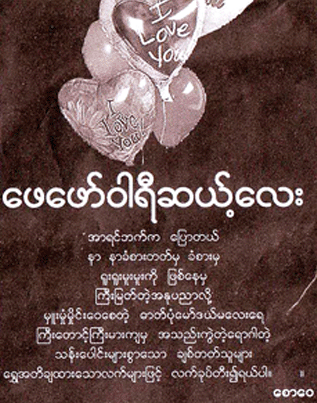In his opening lines to a 1976 article on hidden meaning in poetry, Mya Ketu (pen name of U Chan Mya, a former professor at the Mandalay Arts and Science University) writes that as there are secret matters in life so too there are secrecies in poetic literature. “However,” he goes on, “The secrets in poems are unlike the secrets of hidden crimes; they are merely furtive.”
Mya Ketu either wasn’t thinking very hard or, more likely, was trying not to. There are innumerable examples from around the world of poets condemned for crossing the ambiguous line between furtive secrecies and criminal laws, from Ovid to Oscar Wilde, Marcos Ana to Vaclav Havel. Mya Ketu was himself writing under a government which considered anything contrary to its economic and political program to be offensive, and must have known about banned poems and authors.
In the three decades since, things have gone from bad to worse and the game of hide and seek between Myanmar’s writers and their censors has continued. Some years ago Anna Allot released a small and excellent book with translations of short stories and accompanying comments on how their writers sought to confound their scrutinizers but still speak to their audience. (The full text of the book, Inked Over, Ripped Out, is on the Burma Library.) Some of the stories were published, some not.
Recently, two very different poems that were published attracted wide interest and raised official ire for these very reasons. The poems are “February 14”, by Saw Wai, and “Diparinga”, by Kyi Maung Than.
Saw Wai’s case is the more straightforward of the two. There is little room for doubt that he (or someone) deliberately wrote what roughly translates as “Pow-er cra-zy Gene-ral Than Shwe” into the opening syllables to each line of the short poem, although it is plausible that the magazine editor didn’t notice the covert message in the rush to meet his deadline. That the piece was written for Valentine’s Day and was released in an entertainment weekly called Love Journal only adds to its delicious irony.
Officials embarrassed by inadvertently letting February 14 onto the streets are doing their best to make up for the error. Saw Wai has been in prison for over nine months and is now on trial for intending to cause fear and alarm among the public, whatever that means, for which he will probably get two years. Although news reports say that a censor admitted under oath that the poem was cut from 12 lines to eight after it was originally rejected, his testimony is unlikely to make any difference to the outcome of the case, especially given that the butt of the joke was the Great Father. The journal was also suspended for a week and its editor forced to sign a document to guarantee that this sort of thing won’t happen again.
The cause of offence in Kyi Maung Than’s piece, which was carried in the June edition of Cherry variety magazine, is less obvious. The poem’s title is the ancient name for Depayin, the upcountry township where in May 2003 a crazed army-backed crowd set upon a column of vehicles escorting Aung San Suu Kyi on her last tour before she was put back under house arrest. But its leading stanzas set the scene a good 700 years before that event, with all the usual crap about prior glories and kings. It is in the second half that the poem goes awry, moving outside historical limits: “In this town/ Heroes were lost/ In this town/ Traitors were fledged/ In this town/ A youth/ Fell from his cycle/ In this town/ A woman/ Her time not come, did not lose her life…” It ends in a somber mood, the author remarking that whenever he passes through the town he is frightened by ghosts of the past.
This time around, it was not the poet but the monthly’s editor who was targeted, with an order from the censors that he must be sacked for their screw up, and that a new editorial board must be established. A second editor was reportedly also removed, but no charges were laid and nor was the periodical ordered to stop publishing.
Why did Cherry Magazine get off more lightly than Love Journal? Why has Saw Wai been prosecuted but Kyi Maung Than not? It could be because the second poem was less direct than the first. But it could just as soon be a consequence of timing, money, personal contacts, or accident. Perhaps New Mandala readers know more. In any event, Myanmar’s writers will continue to hone their skills at working between the lines, and although the censors spend their days looking for clues of furtive secrets seemingly crossing the fuzzy border between poetry and criminality, from time to time a double meaning is sure to slip through. The challenge for creative artists remains how to craft their work so that people come to get it, but nobody comes to get them.
 Facebook
Facebook  Twitter
Twitter  Soundcloud
Soundcloud  Youtube
Youtube  Rss
Rss 
